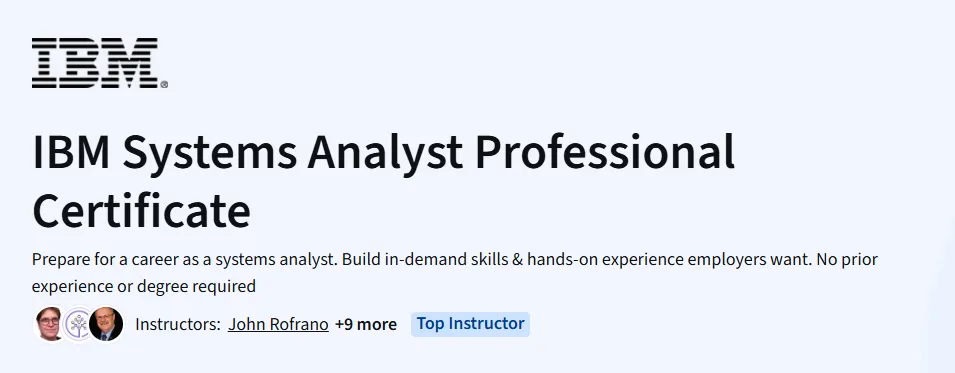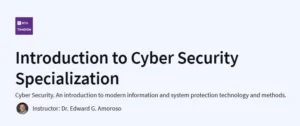What will you learn in IBM Systems Analyst Professional Certificate Course
Understand the role and responsibilities of a systems analyst in IT environments.
Analyze business problems and recommend technological solutions.
Develop models, process flows, and use cases for system requirements.
Master tools for requirements gathering, modeling, and software analysis.
Program Overview
Module 1: Introduction to Systems Analysis
⏱️ 1 week
Topics: Role of systems analyst, software development life cycle (SDLC), requirement types
Hands-on: Analyze a system development scenario
Module 2: Business Process Modeling and Use Cases
⏱️ 2 weeks
Topics: UML diagrams, BPMN, user stories, and use case modeling
Hands-on: Create business process models and use cases for a sample project
Module 3: Requirements Gathering Techniques
⏱️ 2 weeks
Topics: Interviews, surveys, document analysis, workshops
- Hands-on: Conduct mock requirement-gathering sessions
Module 4: Data and Functional Modeling
⏱️ 2 weeks
Topics: ER diagrams, data flow diagrams (DFDs), logical vs physical models
Hands-on: Design data models for a business use case
Module 5: Agile and Waterfall Methodologies
⏱️ 1 week
Topics: Key principles, differences, best use cases
Hands-on: Align system analysis tasks with both Agile and Waterfall projects
Module 6: Tools for Systems Analysts
⏱️ 2 weeks
Topics: JIRA, Lucidchart, IBM Engineering Lifecycle Management
Hands-on: Use cloud-based tools for modeling and tracking requirements
Capstone Project: Systems Analysis for a Real-World Business
⏱️ 2 weeks
Topics: Complete analysis for a hypothetical client
Hands-on: Create documentation, models, and requirement specs
Get certificate
Job Outlook
Growing demand across industries for business and systems analysts.
Titles include Systems Analyst, Requirements Analyst, IT Business Analyst.
Average salary range: $80,000–$110,000 annually.
Remote and freelance roles available in tech and consulting sectors.
Specification: IBM Systems Analyst Professional Certificate
|
FAQs
- No, you don’t need mastery of both areas.
- Having either business or IT exposure is helpful but not mandatory.
- The course introduces core IT and business analysis concepts step by step.
- Modeling tools and workflows are explained with examples.
- Designed for career-switchers as well as IT/business professionals.
- Systems Analysts bridge business needs with technical solutions.
- Business Analysts focus more on requirements and stakeholder communication.
- Systems Analysts create diagrams, models, and system workflows.
- They work closely with developers and architects to implement solutions.
- Both roles are complementary but have different core strengths.
- IT consulting and software development firms.
- Finance and banking for digital transformation projects.
- Healthcare for system integration and compliance tracking.
- Retail and e-commerce for optimizing digital operations.
- Government and public sector organizations implementing IT systems.
- Includes modeling exercises like UML, BPMN, and ER diagrams.
- Hands-on sessions with JIRA, Lucidchart, and IBM tools.
- Mock requirement-gathering workshops to simulate real scenarios.
- Capstone project with a full system analysis for a client.
- Prepares learners to showcase portfolio-ready documentation.
- Systems Analyst or Requirements Analyst.
- IT Business Analyst for enterprise-level projects.
- Solution Designer or Functional Analyst.
- Mid-career transition to Project Manager or Product Owner.
- Long-term progression toward IT Architect or Consulting roles.





